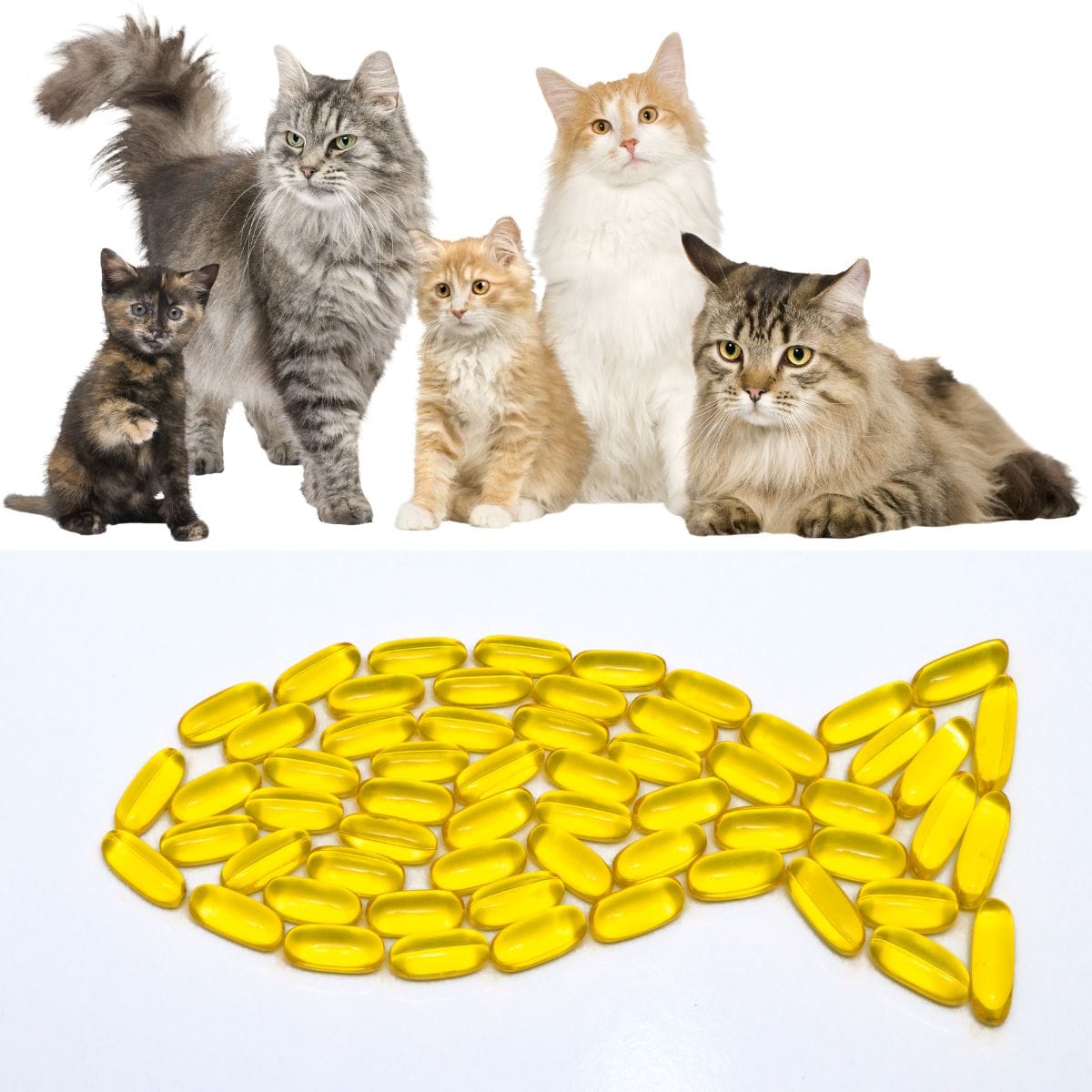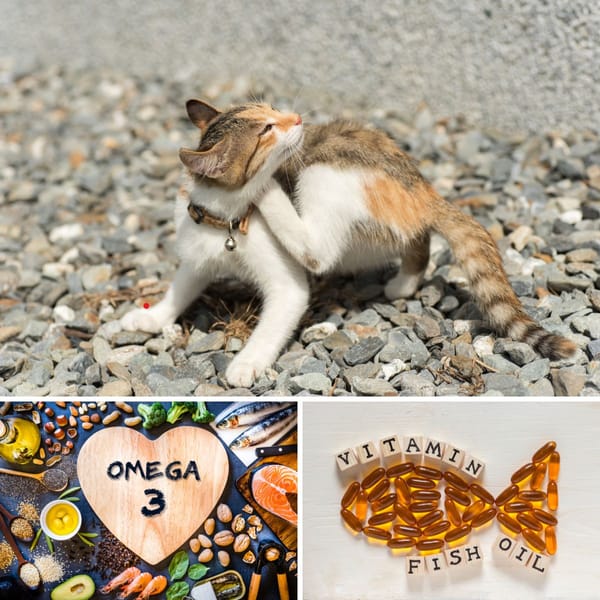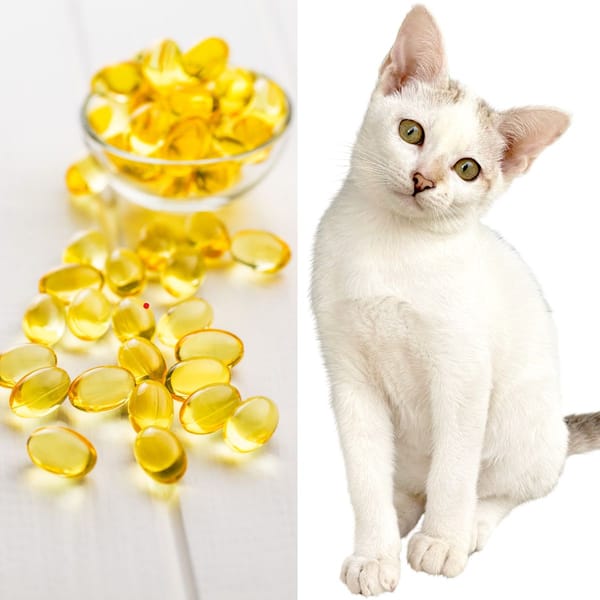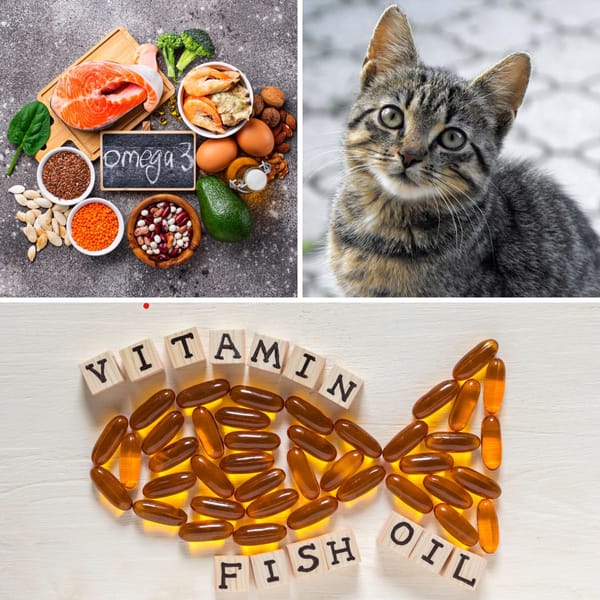Fish oil is often touted as a miracle supplement for both humans and pets, including our feline friends. Rich in omega-3 fatty acids, it's believed to support everything from brain development to decreasing inflammation. However, as pet owners consider adding fish oil to their cat's diet, it's crucial to understand not just the health benefits but also the potential side effects.
Key Takeaways:
- While fish oil can offer health benefits to cats, it can also lead to side effects such as gastrointestinal upset, altered immune function, and blood clotting disorders.
- The dosage of fish oil is critical; too much can lead to nutrient excess and health issues.
- Consultation with a veterinarian is essential before starting a fish oil regimen to avoid negative interactions with existing conditions or medications.
Understanding Fish Oil and Its Components
Fish oil supplements are a popular addition to the modern pet's diet, lauded for their content of essential fatty acids, mainly eicosapentaenoic acid (EPA) and docosahexaenoic acid (DHA). These polyunsaturated fatty acids are crucial for maintaining a healthy coat, skin, and overall well-being. However, the same enzymes that metabolize these beneficial oils also process other fats, which can lead to competition within the body and potential adverse effects.
The Right Dosage: How Much Fish Oil Is Safe for Cats?
Determining how much fish oil to give your cat is a delicate balance. Veterinary medicine has yet to establish a one-size-fits-all dosage, as factors like age, weight, and health status play a significant role. High doses of fish oil can lead to nutrient excess, which may cause more harm than good. It's imperative to consult with a veterinarian to establish a safe and effective fish oil regimen for your cat.
Potential Gastrointestinal Adverse Effects
One of the most common side effects of fish oil supplementation in cats is gastrointestinal upset. Symptoms can range from mild discomfort to more severe issues like diarrhea or vomiting. This is often due to the high-fat content in fish oils, which can be difficult for some cats to digest, especially if given on an empty stomach or in large quantities.
Altered Immune Function: A Double-Edged Sword
Fish oil's anti-inflammatory properties can be beneficial in managing inflammatory diseases, but they can also alter immune function. In some cases, this can lead to an immunosuppressive effect, which might not be ideal for cats with already compromised immune systems or those facing infections.
Skin Allergies and Fish Oil: A Complex Relationship
While fish oil is often recommended for improving skin health, some cats may develop skin allergies as a reaction to fish oil supplements. This could manifest as itching, redness, or other clinical signs of discomfort. It's important to monitor your cat's reaction to fish oil and consult with a vet if any skin issues arise.
Fish Oil and Kidney Disease: A Delicate Balance
Cats with kidney disease need to be particularly cautious with fish oil. Omega-3 fatty acids can benefit kidney function by decreasing inflammation, but they can also increase the risk of bleeding. A vet can help determine the appropriate amount of fish oil for cats with renal disease to avoid exacerbating their condition.
Delayed Wound Healing: An Unexpected Consequence
Fish oil's effect on blood clotting can sometimes lead to delayed wound healing. The omega-3 fatty acids in fish oil can alter platelet function, which is crucial for the blood clotting process. This is particularly concerning for cats that have undergone surgery or those that are prone to injuries.
The Risk of Blood Clotting Disorders
High doses of fish oil can lead to abnormal bleeding and blood clotting disorders. This is due to the anti-inflammatory and anticoagulant properties of EPA and DHA, which, while beneficial in moderation, can cause issues in excess. Monitoring the amount of fish oil and watching for signs of abnormal bleeding is essential.
Omega Fatty Acids: Understanding the Basics and Benefits for Cats
Omega fatty acids are like the unsung heroes in your cat's diet, playing a crucial role in maintaining their health. These fatty acids, which include omega-3s and omega-6s, are found in various foods and supplements, such as liquid fish oil and flaxseed oil. Omega-3s, particularly EPA and DHA, are known for their anti-inflammatory properties, which can help manage conditions like arthritis and allergies. They also contribute to brain health, making them a smart addition to your feline friend's meal plan.
However, it's not just about adding fish oil to your cat's food and calling it a day. The balance between omega-3 and omega-6 fatty acids is key. Most commercial pet foods are rich in omega-6s (like linoleic acid and arachidonic acid), which are essential but can promote inflammation when not balanced by omega-3s. By incorporating the right mix, you can support your cat's overall well-being. Just remember, moderation is key, as too much of a good thing can lead to the side effects we're exploring.
Omega Fatty Acids and Altered Platelet Function in Cats
When we talk about what are the side effects of fish oil for cats, it's crucial to consider how omega fatty acids can affect their little bodies. Omega fatty acids, particularly those with multiple double bonds like EPA and DHA, have anti-inflammatory properties that can influence platelet function. This means that while they can be beneficial in reducing inflammation, they can also potentially increase the risk of blood clots in felines. It's a bit of a tightrope walk, balancing the good with the possible bad.
In the feline world, altered platelet function can be a serious business. If a cat is already prone to blood clotting disorders, supplementing with fish oil needs to be done with caution. The alpha-linolenic acid in fish oil, for instance, can interfere with the cat's normal blood clotting mechanisms. This doesn't mean you need to completely avoid fish oil in your cat's diet, but it does highlight the importance of consulting with a vet to ensure the supplement-derived benefits don't come with unwanted side effects.
Omega Fatty Acids: The Right Blend for Your Cat's Diet
When it comes to your furry friend's health, the balance of omega fatty acids in their diet is crucial. Omega-3s, often found in fish oil, are known for their anti-inflammatory properties, which can benefit cats with conditions like arthritis or allergies. However, it's not just about omega-3s; omega-6 fatty acids are also essential but are typically abundant in a cat's food. The key is to maintain a healthy ratio, as too much omega-6 can promote inflammation. Including a well-balanced source of fish oil in your cat's diet can support their overall well-being, ensuring they get the right mix of these vital nutrients.
But let's not forget about alpha-linolenic acid (ALA), a type of omega-3 fatty acid that's found in plant sources like flaxseed. While cats are not as efficient at converting ALA to the more active forms of omega-3s (EPA and DHA), it still plays a role in a well-rounded diet. By combining fish oil with a variety of omega-rich foods, you can help optimize your cat's intake of these important fatty acids. Just remember, moderation is key, and it's always best to consult with your vet to tailor your cat's diet to their specific needs.
Omega Fatty Acids and Cognitive Function in Cats
Omega fatty acids aren't just about a shiny coat and healthy skin; they play a crucial role in brain health too. Cats, much like humans, can experience a decline in cognitive function as they age. Supplementing your cat's diet with fish oil rich in omega-3s, particularly docosahexaenoic acid (DHA), can support brain health. Studies suggest that DHA has a positive impact on learning and memory, which is vital for keeping your senior cat's mind sharp.
While young kittens can naturally synthesize DHA from alpha-linolenic acid in their bodies, older cats may struggle with this conversion. Therefore, incorporating fish oil into your cat's food can provide a direct source of this important nutrient. Remember, though, that balance is key. Too much of a good thing can lead to nutrient-drug interactions or other health issues, so it's essential to consult with your vet for the right dosage.
Omega Fatty Acids and Liver Health in Cats
Omega fatty acids are not just beneficial for a cat's coat and skin; they also play a significant role in maintaining liver health. The liver is a powerhouse organ, responsible for detoxifying the body and metabolizing fats, and the anti-inflammatory properties of omega fatty acids can help keep this vital organ in tip-top shape. For instance, alpha-linolenic acid, a type of omega-3, has been shown to support liver function and may even contribute to the healing process in cats with liver disease.
However, it's crucial to strike the right balance in your cat's diet. Excessive amounts of fish oil can lead to nutrient-drug interactions, particularly if your cat is on medication for liver issues. Always consult with a vet to ensure that any supplements, including those rich in omega fatty acids, are given in the correct dosage and are harmonious with your cat's food and any medications they may be taking. This careful management can help support liver health without causing additional stress on the organ.
The Synergy of Omega Fatty Acids and Antioxidants in a Cat's Diet
Integrating omega fatty acids into your cat's diet can be a game-changer, especially when combined with antioxidants. This dynamic duo works synergistically to bolster your cat's health. Antioxidants help combat oxidative stress, while omega fatty acids, with their anti-inflammatory properties, can reduce inflammation. Together, they can enhance the overall immune response, potentially leading to a healthier, more vibrant feline.
But here's the kicker: while omega fatty acids are essential, they need to be balanced with other nutrients. Alpha-linolenic acid, for example, should be complemented with sufficient antioxidants to prevent it from becoming rancid in the cat's food. This balance is crucial to avoid any negative nutrient-drug interactions, especially if your cat is on medication. By thoughtfully incorporating these nutrients into your cat's diet, you can help ensure they're getting the full spectrum of health benefits without any unintended side effects.
The Anti-Inflammatory Benefits of Omega Fatty Acids in a Cat's Diet
Chronic inflammation can be a silent adversary in cats, often contributing to a range of health issues from arthritis to heart disease. Omega fatty acids, particularly eicosapentaenoic acid (EPA), have potent anti-inflammatory properties that can help manage these conditions. By incorporating fish oil into your cat's diet, you're not just enhancing their meal with a tasty supplement; you're actively contributing to their long-term health and comfort.
However, it's important to navigate the inclusion of these supplements carefully. The anti-inflammatory benefits must be weighed against potential nutrient-drug interactions, especially if your cat is on medication. Always discuss with your vet before adding fish oil to your cat's food regimen to ensure it complements their existing diet and treatment plan without causing adverse effects.
Nutrient-Drug Interactions: Navigating the Waters with Fish Oil
Introducing fish oil into your cat's diet can be a game-changer, especially for its anti-inflammatory properties. However, it's essential to be aware of potential nutrient-drug interactions. For instance, if your cat is on medication for blood clotting or any anti-inflammatory drugs, adding fish oil could potentially alter the effects of these medications. It's a delicate balance that requires professional insight to ensure your cat's safety and health.
Moreover, the conclusion fish oil supplementation should be reached with careful consideration of your cat's current health status and any medications they may be taking. Always discuss with your vet before making any changes to your cat's food or supplement regimen. They can provide guidance on the appropriate dosage and monitor for any adverse reactions. By doing so, you can harness the benefits of fish oil while minimizing the risks of unwanted interactions, keeping your cat purring happily and healthily.
Nutrient-Drug Interactions: The Fish Oil Factor in a Cat's Diet
Diving deeper into the outlines of potential adverse effects of fish oil, we stumble upon the complex world of nutrient-drug interactions. It's not just about what's in your cat's food; it's also about what else they might be taking. Fish oil supplements can interact with certain medications, altering their effectiveness or even causing adverse reactions. For instance, if your kitty is on medication for high blood pressure or blood clots, the anti-inflammatory properties of fish oil could cause complications.
Let's not forget that fish oil isn't just about omega fatty acids; it's a supplement that's part of your cat's diet. When you mix it into their wet food, you're adding calories and potentially affecting how they absorb other nutrients or medications. It's a bit like a culinary science experiment in your cat's food bowl. Always have a chat with your vet before introducing fish oil to your cat's diet, especially if they're already on other medications. It's all about keeping that purrfect balance in your feline friend's health.
The Role of Dietary Supplements in a Cat's Diet: A Delicate Dance
When it comes to dietary supplements for cats, it's a bit like adding spices to a dish – a little can enhance the meal, but too much can spoil it. Supplementing your cat's diet with added fish oil can offer numerous health benefits, but it's important to understand the potential risks and how to mitigate them. For instance, while alpha-linolenic acid (ALA), found in vegetable oils like flaxseed oil, is an omega-3 fatty acid, cats have limited ability to convert ALA to the more beneficial EPA and DHA. This review describes metabolic differences that are crucial to consider when choosing supplements.
Moreover, the quality of the supplement is paramount to avoid toxin exposure from heavy metals, which can be a concern with fish oil. High-quality, purified fish oil is less likely to contribute to toxin buildup. Additionally, while fish oil can be beneficial, it's essential to be aware of nutrient-drug interactions, especially if your cat is on medication. Consulting with a vet who specializes in companion animal medicine can help you navigate these waters, ensuring your cat reaps the benefits of fish oil without the unwanted side effects.
Heavy Metal Toxicity: A Hidden Danger
Fish oil, especially those derived from fatty fish, can sometimes contain heavy metals like mercury. Long-term exposure to these toxins can lead to heavy metal toxicity in cats. Ensuring the fish oil supplement has undergone rigorous quality control for heavy metal content is crucial for your cat's safety.
Weight Gain: A Side Effect of Caloric Intake
Fish oil is high in calories, and adding it to your cat's food without adjusting their overall caloric intake can lead to weight gain. Obesity in cats is a serious health concern and can lead to other issues such as diabetes and high blood pressure. It's important to factor in the additional calories from fish oil when planning your cat's diet.
Nutrient-Drug Interactions: A Cautionary Note
Fish oil can interact with certain medications, leading to nutrient-drug interactions. For example, if a cat is on medication for heart disease, the anticoagulant effect of fish oil could be amplified, increasing the risk of bleeding. Always discuss with your vet before combining fish oil with any other treatments.
The Debate Over Fish Oil Sources: Cod Liver Oil vs. Standard Fish Oil
Cod liver oil and standard fish oil both contain essential fatty acids, but cod liver oil also has high levels of vitamins A and D. While these vitamins are beneficial, they can cause toxicity in high doses. It's important to choose the right type of fish oil for your cat's needs and to avoid over-supplementation.
Fishy Odor and Bad Breath: Minor but Noticeable Side Effects
A less serious but still notable side effect of fish oil is the fishy odor it can impart to your cat's breath and body. While not harmful, it can be unpleasant for pet owners. Using a high-quality, purified fish oil supplement can help minimize this issue.
The Impact of Fish Oil on Gastrointestinal Disease
Cats with pre-existing gastrointestinal diseases may experience exacerbated symptoms when given fish oil. The high-fat content can be difficult to process for cats with sensitive stomachs or conditions like pancreatitis. It's essential to proceed with caution and under veterinary guidance when introducing fish oil to these cats.
Fish Oil and Feline Heart Disease: A Complex Interaction
While fish oil has heart-healthy benefits, its interaction with feline heart disease is complex. The anti-inflammatory properties can support heart health, but the potential for altered blood clotting requires careful management. A vet can help navigate the benefits and risks for cats with heart conditions.
Senior Cats: Special Considerations for Fish Oil Supplementation
As cats age, their dietary needs change. Senior cats may benefit from the anti-inflammatory properties of fish oil, but they are also more susceptible to its side effects. A tailored approach is necessary to ensure that fish oil supplementation supports their health without causing additional issues.
Summary
Fish oil can be a valuable addition to your cat's diet, offering a range of health benefits due to its rich content of omega-3 fatty acids. However, it's not without potential side effects, including gastrointestinal upset, altered immune function, and blood clotting disorders. The key to safely incorporating fish oil into your cat's diet is to consult with a veterinarian, carefully measure the dosage, and monitor your cat's response to the supplement. By taking these precautions, you can help ensure that your cat reaps the benefits of fish oil without suffering from its adverse effects.
FAQ Section
Q: Can fish oil supplements cause diarrhea in cats? A: Yes, fish oil supplements can cause gastrointestinal upset, including diarrhea, especially if given in high doses or on an empty stomach. It's important to start with a small dose and gradually increase it to the recommended amount.
Q: How much fish oil should I give my cat? A: The appropriate dosage of fish oil for your cat depends on various factors, including their weight, age, and health status. It's crucial to consult with a veterinarian to determine the right amount for your cat to avoid the risk of nutrient excess and other side effects.
Q: Are there any long-term side effects of giving fish oil to cats? A: Long-term side effects of fish oil supplementation in cats can include nutrient excess, weight gain, and the potential for heavy metal toxicity if the supplement is not properly purified. Monitoring your cat's health and choosing high-quality supplements can help mitigate these risks.







